

Social Collaboration: It’s the People Not the Technology, Stupid! I was recently reflecting on my personal experience as a knowledge management consultant in deploying enterprise and business collaborations solutions over the past several years.
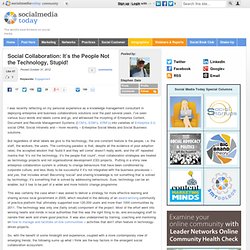
I’ve seen various buzz-words and labels come and go, and witnessed the morphing of Enterprise Content, Document and Records Management Systems (ECM’s, EDM’s, ERM’s) into varieties of Enterprise 2.0, social CRM, Social Intranets and – more recently – Enterprise Social Media and Social Business solutions. But regardless of what labels we give to the technology, the one constant feature is the people, i.e. the staff, the workers, the users. The continuing paradox is that, despite all the evidence of poor adoption rates; the accepted wisdom that “build it and they will come” doesn’t really work, and the oft’ repeated mantra that “it’s not the technology, it’s the people that count”, most collaboration strategies are treated as technology projects and not organisational development (OD) projects. The Imperceptible Impact Of Social Media on Our Everyday Lives. “The essence of ultimate decision remains impenetrable to the observer - often, indeed, to the decider himself” – John F.
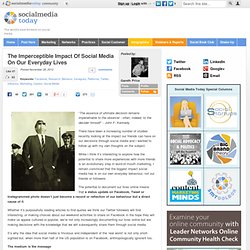
Kennedy There have been a increasing number of studies recently looking at the impact our friends can have on our decisions through social media and I wanted to follow up with my own thoughts on the subject. While I think it’s interesting to explore how the potential to share more experiences with more friends is an evolutionary step in word-of-mouth marketing, I remain convinced that the biggest impact social media has is on our own everyday behaviour, not our friends or followers. The potential to document our lives online means that a status update on Facebook, Tweet or Instagrammed photo doesn’t just become a record or reflection of our behaviour but a direct cause of it.
The medium is the message The consistently excellent Cyborgology blog recently speculated how different Facebook would be if you removed likes, comments and friend counts. The End of Search as We Know It. As the world shifts to all things mobile, anew reality is emerging: mobile devices are killing search as we know it.
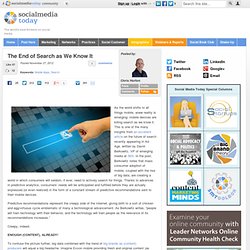
This is one of the many insights from an excellent article on the future of search recently appearing in Ad Age, written by David Berkowitz, VP of emerging media at 360i. In the post, Berkowitz notes that mass consumer adoption of mobile, coupled with the rise of big data, are creating a world in which consumers will seldom, if ever, need to actively search for things. Thanks to advances in predictive analytics, consumers’ needs will be anticipated and fulfilled before they are actually expressed (or even realized) in the form of a constant stream of predictive recommendations sent to their mobile devices. Predictive recommendations represent the creepy side of the Internet, giving birth to a sort of chicken and egg/virtuous cycle emblematic of many a technological advancement. Creepy, indeed. As the old saying goes, the only constant is change. But wait, there’s more.
Is Social Media a Broadcast Right? University of Washington Plows New Ground. Limit in-game tweeting by reporters?
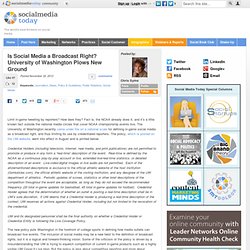
How dare they? Fact is, the NCAA already does it, and it’s a little known fact outside the national media circles that cover NCAA championship events live. Social Media and Employee Rights. More and more people are joining social networks on a daily basis and employers believe these networks are a source of information about their employees.
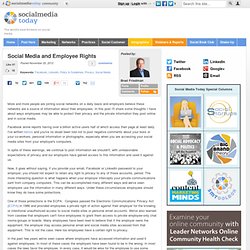
In this post I'll share some thoughts I have about ways employees may be able to protect their privacy and the private information they post online and in social media. Facebook alone reports having over a billion active users half of which access their page at least daily. I've written before and you've no doubt been told not to post negative comments about your boss or your co-workers, personal information or photographs, especially when you are accessing your social media sites from your employer's computers. In spite of these warnings, we continue to post information we shouldn't, with unreasonable expectations of privacy and our employers have gained access to this information and used it against us.
One of those protections is the ECPA. Should Live Tweeting Be Protected Like Broadcast Rights? Just like accurate reporting and crafting a solid lead, knowing how to live tweet a game or event has become a necessary skill for journalists in the digital era.
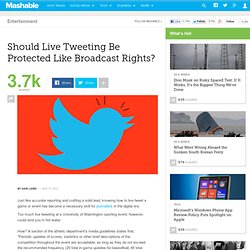
Too much live tweeting at a University of Washington sporting event, however, could land you in hot water. How? A section of the athletic department's media guidelines states that, "Periodic updates of scores, statistics or other brief descriptions of the competition throughout the event are acceptable, as long as they do not exceed the recommended frequency (20 total in-game updates for basketball, 45 total in-game updates for football). " That policy was instituted in August, an athletic department spokesperson tells Mashable, but just recently gained attention after Tacoma News Tribune reporter Todd Dybas tweeted Monday night that he had been "reprimanded" by department officials for excessive tweeting during the Huskies basketball game against Loyola. The 2nd Generation of Social is Here. You know you’re still implementing tactics from the first generation of social if you: Have built a large social audience, but are still scratching your head trying to articulate if and how it’s valuable.Have fallen in and out of love with social advertising faster than you can say Kim Kardashian.Are struggling to move from interacting with your social audience to truly engaging with them.All of the above.
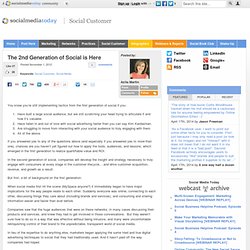
If you answered yes to any of the questions above (and especially if you answered yes to more than one), chances are you haven’t yet figured out how to apply the tools, audiences, and lessons, which emerged in the first generation to realize quantifiable value and ROI. In the second generation of social, companies will develop the insight and strategy necessary to truly engage with consumers at every stage in the customer lifecycle….and drive customer acquisition, revenue, and growth as a result. But first, a bit of background on the first generation: Connect: How to Effectively Rebrand Your Social Media Profiles. How to Effectively Listen on the Social Web [Infographic] For many brands, one of the appealing aspects of social media is the opportunity to target and acquire new customers.
![How to Effectively Listen on the Social Web [Infographic]](http://cdn.pearltrees.com/s/pic/th/effectively-listen-infographic-43408134)
Marketers can also use social to learn more about existing customers and use that knowledge to increase the relevancy of your messaging. But how can you do this effectively? The tools already exist to monitor social conversations and unlock key insights into who to reach, how to reach them, and the right messaging to use. 3 Personal Problems Sabotaging Your Social Media Success (And How to Fix Each) Your social media success isn't dictated by your budget, competition, or bad economic conditions.
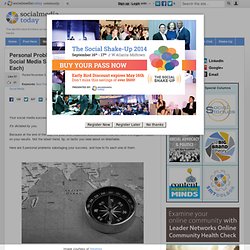
It's dictated by you. Because at the end of the day, it's your skill, expertise and execution that will have the biggest impact on your results. The Problem With Impressions. Too often my meetings with online media network salespeople sound something like this: Me: "So how did our campaign do?

" Salesperson: "Great. You performed within range -- getting 1/10 of 1% response based on number of impressions delivered. " Me: "Um, how is that a great result? " (C'mon … what am I supposed to do with 1/10th of 1% CTR anyway?) Salesperson: "Well that's based on 500,000 impressions and its well within the range of other brand campaigns. " Me: "Can you tell me how many real people were reached by the ad buy? Increasing User Engagement on Facebook. If you use Facebook as a tool for promoting your business or brand, then you have probably noticed that Facebook has recently updated its EdgeRank, also known as its News Feed Algorithm.
Social Media: What's the ROI of Not Doing It? Social Media ROI is Not the Same as Social Media Value It’s a simple concept, but many organizations struggle with the notion that every “Like” and every “Retweet” comes along with a dollar sign. Instead, businesses need to understand that there is a chain of events that will lead to the dollar sign. It isn’t going to happen overnight, but over the long-term, the value will become clearly visible. Sociology and Social Media. When social media first became popular, its general concept was a paradigm between people (sociology) and technology.
Public conversations made involvement from outside parties possible. Over time, the purpose of social media has changed. What sociology is and how it relates to technology Sociology is defined as “The science of human society.” Eventbrite Isn’t Just Selling Tickets, It’s Building A New Kind Of Social Platform. Every time you invite people to an event, you create a mini social network. Startup ticketing platform Eventbrite aims to help put that physical network to use in online apps. Think about automatically sending a tweet when you walk into an event to announce yourself, Eventbrite CEO and co-founder Kevin Hartz suggests.
Hartz goes on: “Think about using Instagram at an event. That could be better shared among [attendees]…You can imagine on the professional side, what could happen with LinkedIn after an event.” None of these hypothetical examples is a priority for Hartz himself. For the last 18 months, developers have been able to easily add Eventbrite-powered capabilities to their apps. Giving people the ability to share, mingle, and keep in touch with the people who they attend events with is arguably more useful than offering new ways to interact with their 800 Facebook friends. “There’s almost nothing as powerful as a live experience,” explains Hartz's wife and cofounder, Julia Hartz. Why You Should Be Interested In Facebook Interest Lists. A few months ago Facebook rolled out a new feature called Interest Lists. How Instagram, Pinterest and Tumblr are Blasting Social Media Monitoring tools.
STOP! Why They’ll Unlike You If You Post That. 5 Social Media Metrics You Should Be Monitoring. Infogr.am Launches To Kill The Careers Of Struggling Infographic Designers. Infogr.am wants to create a sort of Adobe Illustrator in the Cloud, allowing anyone to create cool info-graphics on the fly. Back in February European accelerator HackFwd invested in the startup from Riga, Latvia, and now it’s fully launched its service. It’s competing in the space with Piktochart and Easel.ly. Facebook: Here's How You Pay to Promote Posts. 5 Predictions for Social Media Law in 2012. Brian D. Wassom is a commercial litigation attorney and a partner at Honigman Miller Schwartz and Cohn LLP in Detroit, Mich. Optimum Facebook Posting Times. What to Look for When Hiring a Social Media Community Manager. Many businesses know the buzz words or the basic functions of the community manager's role on social channels, many don’t have clarity as to what they actually need or what a community manager does beyond tweeting and posting.
If you're looking to hire someone for this role, read this first. A community manager's role is often more broad than businesses suppose. So, what does a community manager actually do? Create And Track Pinterest Campaigns Using Pinerly. The Social Era Is More Than Social Media. The Top 11 Colleges on 6 Social Media Sites [Infographics] The Best Times To Post To Facebook, Twitter, Google+ & Other Social Networks [Infographic] Digitally Savvy Students Play Hide-and-Seek With Campus Messages - Technology.
3 Policies Often Neglected by Facebook Page Admins. How to Make Social Media Less of a Time Suck. _SocialProfilesHelpKFFINAL33.png (1000×2850) 3 Warning Signs That Your Marketing Campaign Will Fail. 9 Facebook Marketing Tips From Top Experts. Is the Status Update Dead? 36% of Tweets Are Photos [Infographic] Twitter Marketing: Does it Still Matter? 5 Critical Mistakes Businesses Make with Social Media. The Ultimate Guide To Creating Viral Content. Are Sound Waves the Future of Mobile Marketing? 3 Reasons Your Company Should Be Using YouTube For Recruitment [Infographic] The London 2012 Socialympics [Infographic] I’m not just an athlete, I’m a social media expert, too!
3 Social Marketing Hacks: A Cheat Sheet for Getting More Fans and Followers. Why Should I Comment on Blog Posts? How Twitter Has Talked About the Summer Olympics [INFOGRAPHIC] Is this the end of Facebook as an Advertising Platform? The Rules of Social Media. J.C. Penney Spikes After Fashion Critic Tweets Praise. Understanding the Value of a Facebook Fan. 5 Clever Social Media Campaigns To Learn From. Why Twitter Is a Better Brand Platform Than Facebook. Bon Iver Wants You to Remix His Songs for Spotify Album. Need-to-Know Formula for User-to-Fan Conversion on Facebook.
Executing a Social Media Exit Strategy. How to Win Friends and Influence People… in Social Media (Exclusive Summary) What Facebook Can Tell Us About Olympics Fans [INFOGRAPHIC] Museum Will Use Twitter To Gather Public Experience Of Olympics. The easy, tweet about this link generator. University of Kentucky Football Tweets Become Billboards. 5 Things To Do AFTER Your Next Press Release.
BandPage Unshackles From Facebook, Now Helps 500K Musicians Build Synced Sites and Widgets Too. More People Use MySpace Than Twitter & Other Social Media Surprises [INFOGRAPHIC]